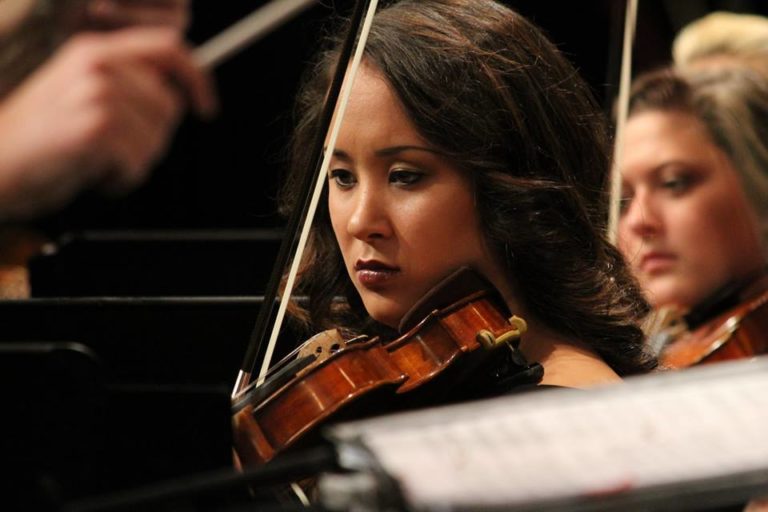
All musicians are unique in their own way, but many take similar or traditional routes to pursue their dream of becoming a professional musician. AYS Orchestra Management Fellow and violinist Sarah Bunch, however, forged her own path to achieve her accomplishments. Although she has taken an unconventional approach to her musical career, she is just as successful as many of her colleagues.
I come from a pretty large family of six children—all of us homeschooled. It was important to my mom that her kids have a well-rounded education beyond academics, so she put us in several extracurricular activities, music being one of them. She’s a pianist herself, so when we were very young she started each of us on piano. We were required to take lessons from her for at least two years, then we could branch out into other instruments—ones she picked out for us. I started piano at age 6, then switched to violin when I was 8. At the time I was ready to learn a new instrument, my sister, who is two years older, was also about to start her own instrument. My mom gave us the violin and harp as our choices. It was an easy decision for me. I had no idea what a harp was, but I had seen the violin at my older siblings’ orchestra concerts and thought it looked cool. My first three to four years of training was with a fiddle teacher who lived close to me. He taught me to play country music and entered me in several fiddle competitions. Around that time, my siblings’ orchestra conductor, who is a classical violin teacher as well, came to know me through the concerts I attended. She took an interest in me, and by the time I turned 11 had convinced my mom to let me take lessons from her. My training as a classical violinist began with her. I am the only sibling who pursued music professionally. However, all my siblings are very competent musicians, and we used to perform as a group for many occasions.
I remember this decision very vividly. At the time, I was a sophomore in high school and was heavily involved in both music and ballet. Only two years away from graduation, I felt immense pressure to choose one or the other. Those were the only professions I had an interest in pursuing, and both were equally time-sensitive. It was the summer of 2013 when I attended a four-week ballet intensive at BalletMet in Ohio. I’m super big on “things happen for a reason,” and I was hoping this experience might give me some clarity. It did. I had a miserable time. I spent most of the camp sitting out of class because I was injured. I also noticed that I didn’t enjoy being in the studio everyday, and I hated taking corrections. The following summer, I attended Idyllwild Arts High School Symphonic Orchestra and ChamberFest programs. I loved it—the environment, and everything about it. That was the first time my peers and teachers had the ability to inspire me to be better at my craft. My passion for music really set in that summer, and I knew it was what I needed to do with my life.
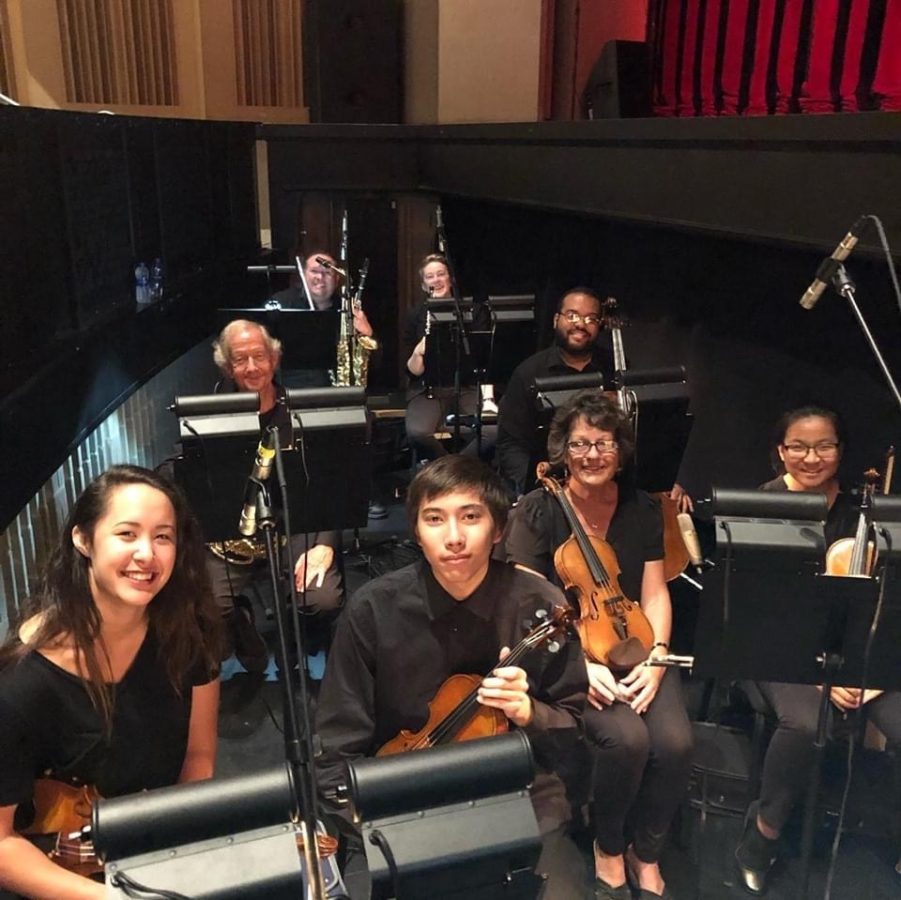
When I was younger, there was one violinist I really admired—Máiréad Nesbitt. She used to be the fiddler for a group called Celtic Woman. She is this gorgeous performer that dances around while she plays and has an incredible stage presence. I only ever saw her play live, which I found to be very impressive. Even though she was jumping up and down, her sound remained amazingly pure and undisturbed. Another musician I looked up to is the film composer Harry Gregson-Williams. He wrote the soundtracks for Narnia, Shrek, The Martian, and several other films. I used to listen to his music all the time; and soon as I started writing my own music, he became an influence in that regard.
My violin teacher, Patricia Graham. She’s the reason I am where I am today. She’s not just my teacher, she’s my best friend, my mentor, my mom. From when I first became her student to now, she’s forever been my biggest cheerleader. My other biggest supporter is my best friend, Kira Sopp. We became close friends in 2014 at the music camp in Idyllwild. She’s my rock and has always had my back throughout my life.
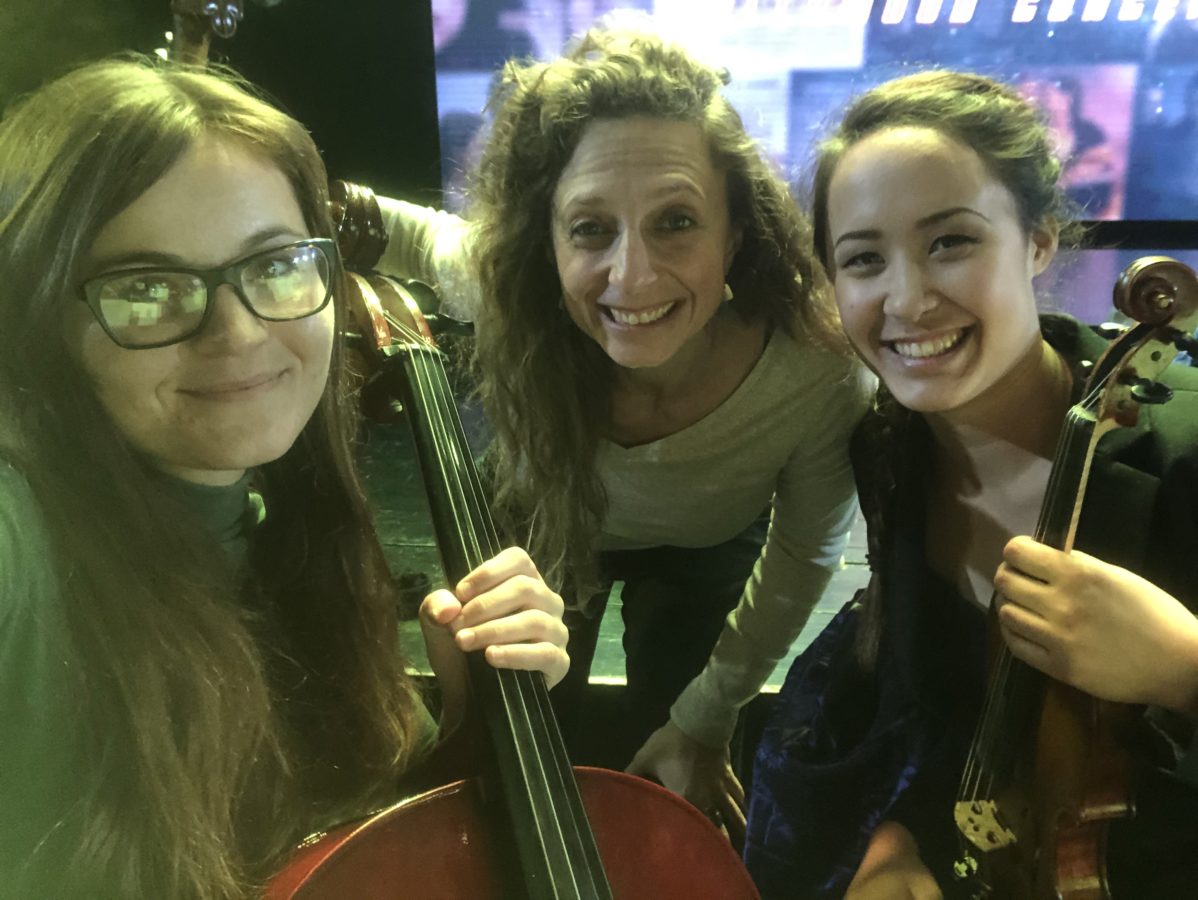
Learning to play in an orchestra is essential to your skillset as a violinist. The earlier you start, the better. Where I come from, orchestra programs are a little hard to come by, unless it’s within the context of public school or community college. Fortunately, my violin teacher Patricia, runs a unique non-profit orchestra program called West Coast Classical. This program has classes for beginners all the way to the pre-professional level. Being that I was homeschooled, I was lucky this program existed. I started playing in it when I was 13 and still play with it now. It’s honestly the best orchestra in the Antelope Valley, and I’ve yet to see anything else like it. When I first joined, I was placed in her top two orchestras and was seated in principal chairs. This meant I felt a lot of pressure to learn quickly and be on my A-game all the time. It wasn’t long before Patricia gave me other opportunities outside of orchestra. Alongside the millions of things she does, Patricia conducts pit orchestras for community and regional theater musical productions. She started bringing me onto her shows when I was 13. Playing alongside professional musicians was extremely valuable and brought my experience level up early on. Later in high school, I had the opportunity to play in more prestigious orchestras like Idyllwild Symphonic Orchestra and Chamberfest as well as SCSBOA High School Honors Orchestra. These experiences built on my strong orchestral foundation and have been integral in making me into the player I am now.
Honestly, I’m not certain. I imagine my future looking similar to how it is now, but instead of juggling projects and jobs I don’t have much interest in, it will be doing all the things I love, which are many. I love to perform, but more than in just the context of orchestra, although I do enjoy that too. I love to solo—not classically. There’s a certain artistic freedom and thrill I get from soloing, and I like that it connects me with my audiences better. I haven’t had many opportunities to record, so I would like to do more of that if the chance arises. I really enjoy playing pit. It’s completely different from playing in a traditional orchestra because you’re accompanying a live show that could be different every night. It would be amazing to one day play for a Broadway show or a ballet. I also make my own music. Lately, I’ve been trying to learn about music production so I can put out my own stuff. My philosophy right now is to just walk through doors as they open and as they feel right. Hopefully I’ll work my way into a life that fits me and my many interests.
Definitely experiences to remember and ones I don’t take for granted. It’s not everyday a musician gets the chance to play at Carnegie Hall in New York or Dvorak Hall in Prague. Those are my top favorite halls I’ve played in so far. Chongqing Concert Hall in China is probably my third favorite, only because it was architecturally unique and incredible. Getting to hear yourself in these halls is quite an experience—the sound is magnificent. I remember being at Carnegie Hall, and the clarity coming from every single instrument onstage was just insane.
The year I joined AYS, I was going through a bit of a rough patch. I had just dropped out of junior college, after deciding that that path was not for me. I ultimately realized that there were other ways to pursue my music goals, ones that were less expensive and didn’t make me take classes I didn’t want to take. I knew it would be more challenging, but it felt worth it. If it didn’t work out, I could always go back to school. Patricia, knowing I had dropped out, pushed me to audition for AYS. I hadn’t heard of it, but it made sense to me to audition for an orchestra that had a very prestigious reputation in the music world; as I didn’t have my own plan moving forward, and it could possibly open up several doors to me if I got in. Preparing for this audition was one of the more stressful things I’ve done. It was my first professional orchestra audition experience, and I felt like a lot was banking on it to go well. I was ecstatic when they accepted me.
I’ve played with high-caliber musicians before in high school—there’s nothing like it. It’s always exciting to play with people who’ve put just as much dedication as you have into their craft (if not more) and who are amazing at it. AYS is the first semi-professional orchestra I’ve played in. What makes it different is that a large percentage of the musicians are seasoned players. There’s a totally different vibe playing with students than playing with professionals. You know, looking at the other people in the room, that most of you have the same drive, are probably reaching for similar goals, and are sharing the same passion. Everyone is at a different pace. Some are further along than others, which makes for an incredible atmosphere that continuously inspires you to grow. The expectations are also different. Playing with AYS is probably as close to a real-world professional orchestra experience as I could get.
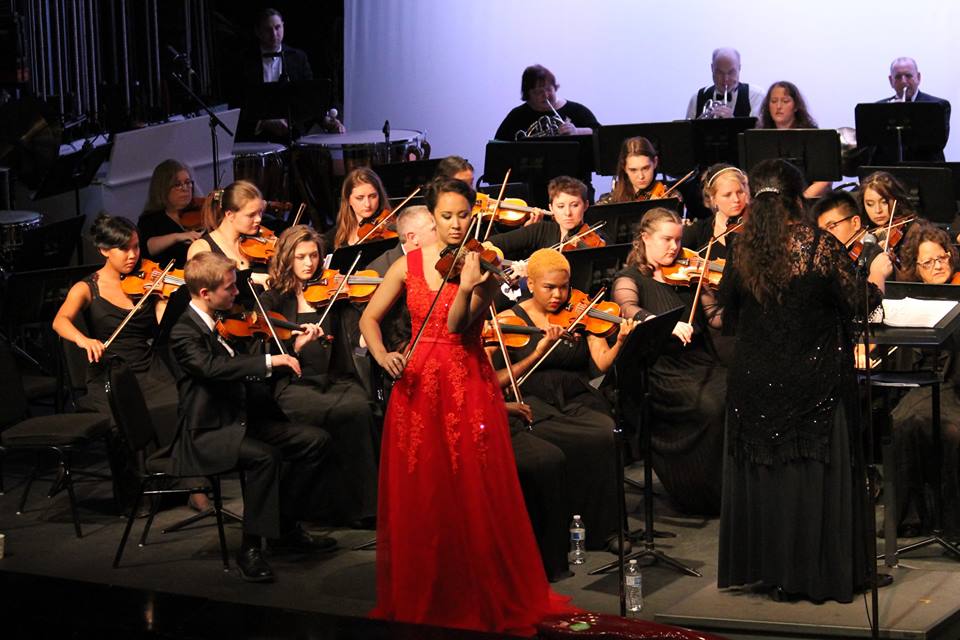
For the past few years, I’ve served on the board of directors for West Coast Classical, my orchestra back at home. I’ve gotten to see the behind the scenes of running the organization and help it succeed in all its endeavors. Being on the board has shown me that I have a passion for innovation and problem solving. It’s very fulfilling to help an organization that I like reach its vision. Another thing I like to do is write. This last year I became board secretary, which means I write down the minutes and compose emails. I weirdly love doing it. When the AYS orchestra management fellow position opened, it immediately made sense to me to apply for it. I’m only in the first few weeks of my new position, but the territory already feels familiar. Of course, everything is on a much larger scale and there’s a lot I’m having to learn but I’m very much enjoying myself and am excited to be working for AYS in this new capacity.
For as long as I have this fellowship, I plan on absorbing as much information as I can. It’s amazing that I even have this opportunity to see behind the curtain of such a prestigious organization and work with highly established individuals. I also hope that this fellowship will build more confidence in myself. I see this as a growing opportunity, one that will add to my value as a musician and a person.
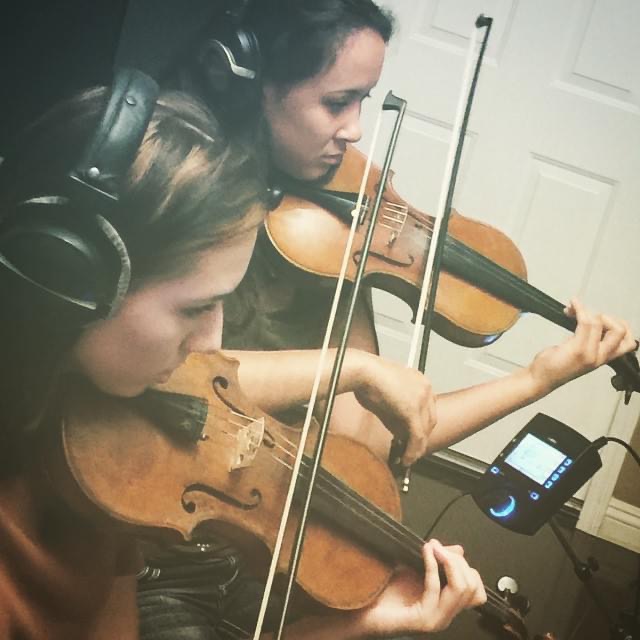
I don’t actually know of any musician who doesn’t freelance. Musicians are often independent contractors, and the length of their contracts vary. A lot of contracts are very short, some lasting only a couple of hours to a day. Others can be a full-time position in an orchestra like the LA Phil. As a freelancer, your work life hopefully consists of a steady stream of these gigs. Of course, if you have a full-time position with an orchestra, I’d say that’s a pretty reliable situation. My music work life consists of small, sporadic gigs, part-time contracts, AYS, and a small studio of private students. My aim is to one day land bigger and longer-lasting contracts so I can gradually take away some of the smaller jobs I don’t always prefer. It’s definitely a spontaneous lifestyle, but I enjoy that aspect of it.
I started teaching private violin lessons when I was 15. Shortly after I started teaching privately, I was given the opportunity to run beginning string classes for West Coast Classical. Teaching is quite a learning experience and has many challenges. You think you know something, until you have to explain it to someone else. Music came very naturally to me as a kid. I intuitively understood it. In order to effectively teach it, there was a lot I had to reteach myself. More challenging than teaching itself was being an entrepreneur and dealing with my clients. I had to write my own policies and learn how to balance my relationships with clients (parents) and students. Though I might have enjoyed teaching a particular student, that didn’t mean their parent was easy to work with. Of course, the most enjoyable part of teaching is seeing my students grow and progress—that is very rewarding.
I’ve always enjoyed creating my own music. When I was a kid, I made up melodies on the piano and wrote them down. Later, I found Audacity. I’d use whatever instruments were lying around the house and record myself playing the different parts I’d improvise. Now, my favorite way to create music is digitally, and I’ll record my violin on my projects occasionally too. I’m not good at identifying genres, but I’d describe my music as atmospheric. I like to create a mood. My songs don’t generally take on a particular structure, but I do like using layering and patterns. Currently, I’m working on a collection of songs that I’d eventually like to release as an album; but there’s still a lot of work to do.
Besides producing my music, I would really like to start auditioning for professional orchestras once they’re back into full swing. It was something I’d planned on doing pre-pandemic, and it’s something I still want to do. Even if I don’t land a spot anywhere, it’s still beneficial for me to continue refining my auditioning skills and practice performing well under pressure.
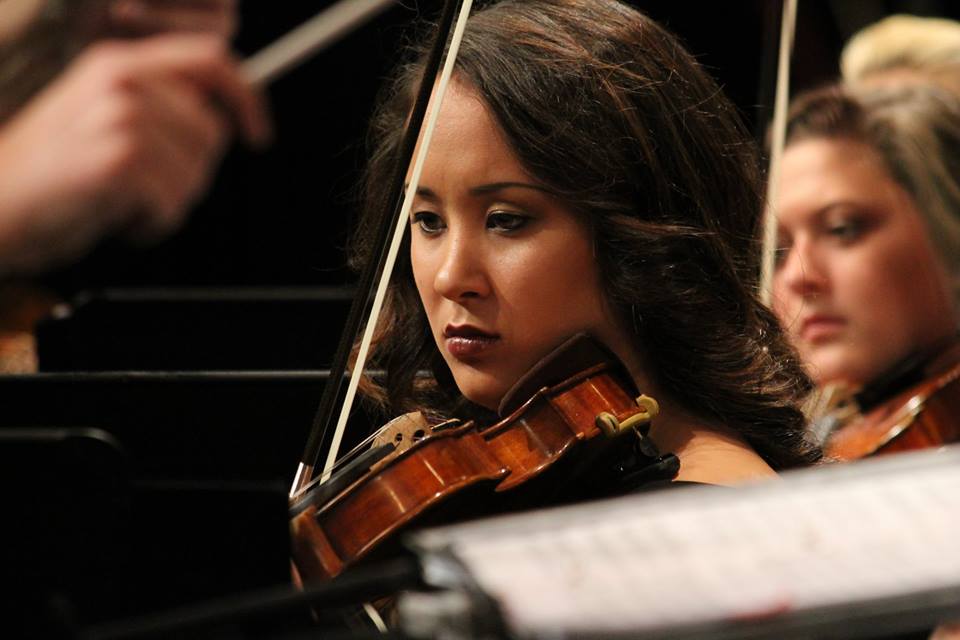
About Sarah:
Sarah is a violinist in Los Angeles County. She was raised in the Antelope Valley and spent the majority of her younger years training under the private instruction of Patricia Graham. Sarah is an active member of a non-profit orchestra called West Coast Classical. She grew up in the program and is currently concert master of the Symphonic Orchestra, director of the beginning strings, and serves as Board Secretary on the board of directors. In her time with them, she has performed at Carnegie Hall, Walt Disney Hall, Dvorak Hall, and Muth Hall. In high school, to supplement her training, she attended Idyllwild Arts Academy for two consecutive summers, performed with SCSBOA High School Honors Orchestra, and completed the Royal Conservatory of Music Level 10 examination with First Class Honors. Besides her continued involvement with West Coast Classical, Sarah is a freelancer in SoCal. She’s played pit for numerous productions in both community and regional theater, toured in China with the Hollywood Concert Orchestra, performed with Debut Chamber Orchestra, and since 2019 performs with American Youth Symphony. Sarah also teaches violin lessons privately and creates her own music. She plans to continue to grow her musical career, develop herself in as many ways possible, and aspires to one day establish her musical mark in the world.
Sarah performing the Bruch Violin Concerto No. 1 in G Minor with West Coast Classical Symphonic Orchestra in June 2017.
If you want to support AYS and the education of young musicians, consider making a donation today. Learn more about our Champion program and sponsoring a musician on our website or by emailing development@AYSymphony.org.